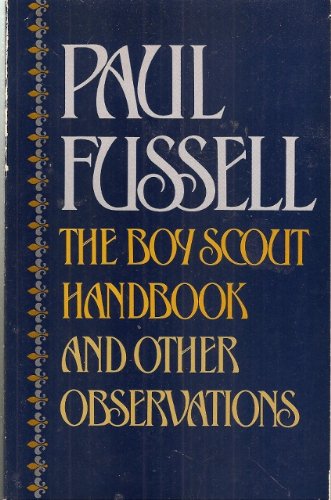In the second part of his tribute to the work of the late Paul Fussell, Adam Somerset reviews his 1982 collection of essays.
Paul Fussell was the author of twenty-one books and editor or co-editor of another four. The Boy Scout Handbook and Other Observations and Thank God for the Atom Bomb and Other Essays, six years later, run to five hundred and fifty pages and contain forty-eight essays. This first book has thirty-four briefer pieces on Americana, literary topics, travel and war. The essays in the second book are longer and their subject is battle.
The best of essays intertwine several writerly gifts. One is the ability to evoke, to carry the reader elsewhere. Fussell is with the young Boswell at the head of an Edinburgh mob, later boring Voltaire to such an extent that the Master of Ferney puts on a fainting fit. Cast down by a severe gonorrheal attack, Boswell attends a Garrick Shakespearean festival in the costume of an armed Corsican bandit.
The Prince of Wales, the future King Edward VII, makes a visit to Egypt. The Khedive supplies six blue and gold steamers for a Nile trip; each tows ‘a barge packed with provisions including 3000 bottles of champagne, 4000 bottles of claret and 20,000 of soda water.’ A few years later into a turbulent century Fussell records that a young Somerset Maugham is in Petrograd in 1917. His mission is to channel British government money to the revolutionary government to keep Russia in the war. He fails, with the Bolshevik coup and Brest-Litovsk.
A literary critic worth the name has insight. Fussell gets beneath the surface behaviour of Evelyn Waugh. He detects the stance of ethical idealism and absolute moral principle. The shambolic Crete campaign is more than military rout. Waugh feels it as personal shame. Fussell sees in Boswell again the roots of modernity. It is not just the degree of self-consciousness and the sexual marauding but he sees Boswell as the inventor, or the inaugurator, of the concept of the interview.

by Paul Fussell
Oxford University Press 1982
Fussell is a hawk on language. He praises the author who can distinguish ‘pitiful’ from ‘pitiable’. He rampages through jargon, cliché and error of grammar in an essay titled ‘Can Graham Greene write English?’ He stamps on the misplaced modifier. On occasion his view sounds not quite right. Commenting on the gratification of a well-placed mirror, he writes that ‘a couple can watch itself’. It is correct but sounds awkward. He dislikes the changing of ‘inflammable’ to ‘flammable’; but time has made it sound right.
The essays and reviews, published across Harper’s, the New York Times, are up to forty-five years old. They are revealing of their age but contemporary reference intrudes only rarely. The thirty-eighth President is referred to as the Great Pardoner. Fussell’s journey through the books proscribed in apartheid South Africa is mind-boggling. In our age of surfeit it is astonishing to find that a critic can lament that The Waves, Jacob’s Room and The Voyage Out are all out of print in the USA. For the student born in the age of the Gutenberg Project and the Long Tail the concept of ‘out of print’ has probably lost its meaning.
‘The War in Black and White’ deals with seven war photographs. It comes from the same period as Susan Sontag’s seminal essays on photography and needs to be read as a critical record drawn from primary experience. The last quarter of the book comprises nine pieces on the Second World War. In ‘My War’ he writes ‘My war is virtually synonymous with my life.’ His life mission became, after a period of teaching the Augustan age, to report the truth of his war and, vicariously, the experience of all on the front-line.
In ‘Some Truth about the War’, he claims that the first German bombs were jettisoned from the air by accident over London. That set off an escalation of bombings. Speer in his Spandau: The Secret Diaries (not in Fussell), visits a ball-bearing factory that has been calamitously hit. Nothing moves without ball bearings and Speer is surprised that the Allies do not try again. As Fussell writes, RAF policy is focused on the wooden medieval cities of Hamburg and Frankfurt.
Fussell reviews that most biting of on-the-spot memoirs, Norman Lewis’s Naples ’44. He reads a pamphlet given to Japanese troops prior to the capture of Singapore. The author is a Colonel Tsuji. It is filled with practical advice and Fussell calls it ‘brilliant … the first survival manual for jungle fighting, and one of the best.’ By the time it has got into the hands of Allied propagandists it has become ‘A Brutal Manual for the Invaders’.
Fussell is equally a combatant in literary wars. An essay on ‘Being Reviewed’ is the best ever. He cites Doctor Johnson that a book ‘should be attacked as well as praised. Fame is a shuttlecock. If it be struck at only one end of the room, it will soon fall to the ground.’
The Boy Scout Handbook and Other Observations is handsomely bound and designed to the quality to be expected from Oxford University Press.It is a marvellous book. Paul Fussell was a near-contemporary of Gore Vidal. He was born eighteen months earlier and pre-deceased him by one hundred and thirty days. The New York born Vidal was sent to fight in the Pacific, and the teenage Californian, Fussell, to France and Belgium. Plain Paul from Pasadena did not have the Vidal background, the privilege, the politics or the hauteur. But he was equally a writer. Of a uniquely strange literary figure he writes ‘If the actual Frederick Rolfe was ragged, nutty, stubborn, and disaster-prone, Baron Corvo had swank and elegance.’ Fussell’s essays are a quarter the length of the weighty Vidal corpus. In quality the two authors stand shoulder to shoulder.










